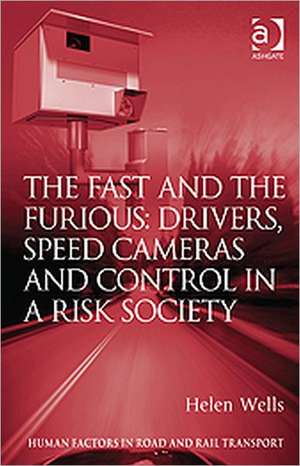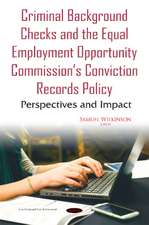The Fast and The Furious: Drivers, Speed Cameras and Control in a Risk Society: Human Factors in Road and Rail Transport
Autor Helen Wellsen Limba Engleză Hardback – 21 dec 2011
| Toate formatele și edițiile | Preț | Express |
|---|---|---|
| Paperback (1) | 404.43 lei 3-5 săpt. | +20.85 lei 5-11 zile |
| CRC Press – 31 mar 2017 | 404.43 lei 3-5 săpt. | +20.85 lei 5-11 zile |
| Hardback (1) | 1111.72 lei 6-8 săpt. | |
| CRC Press – 21 dec 2011 | 1111.72 lei 6-8 săpt. |
Din seria Human Factors in Road and Rail Transport
- 8%
 Preț: 404.38 lei
Preț: 404.38 lei - 8%
 Preț: 404.43 lei
Preț: 404.43 lei - 30%
 Preț: 861.11 lei
Preț: 861.11 lei - 15%
 Preț: 427.16 lei
Preț: 427.16 lei - 18%
 Preț: 1117.07 lei
Preț: 1117.07 lei - 15%
 Preț: 455.31 lei
Preț: 455.31 lei - 15%
 Preț: 427.16 lei
Preț: 427.16 lei - 15%
 Preț: 427.16 lei
Preț: 427.16 lei - 15%
 Preț: 427.16 lei
Preț: 427.16 lei - 24%
 Preț: 336.66 lei
Preț: 336.66 lei - 15%
 Preț: 431.25 lei
Preț: 431.25 lei - 22%
 Preț: 355.49 lei
Preț: 355.49 lei - 22%
 Preț: 353.39 lei
Preț: 353.39 lei - 18%
 Preț: 1008.97 lei
Preț: 1008.97 lei - 15%
 Preț: 426.20 lei
Preț: 426.20 lei
Preț: 1111.72 lei
Preț vechi: 1355.75 lei
-18% Nou
Puncte Express: 1668
Preț estimativ în valută:
212.79€ • 231.22$ • 178.86£
212.79€ • 231.22$ • 178.86£
Carte tipărită la comandă
Livrare economică 21 aprilie-05 mai
Preluare comenzi: 021 569.72.76
Specificații
ISBN-13: 9781409430896
ISBN-10: 1409430898
Pagini: 244
Dimensiuni: 156 x 234 x 16 mm
Greutate: 0.53 kg
Ediția:1
Editura: CRC Press
Colecția CRC Press
Seria Human Factors in Road and Rail Transport
ISBN-10: 1409430898
Pagini: 244
Dimensiuni: 156 x 234 x 16 mm
Greutate: 0.53 kg
Ediția:1
Editura: CRC Press
Colecția CRC Press
Seria Human Factors in Road and Rail Transport
Cuprins
Contents: Introduction; A brief history of speed limit enforcement; Contradictory expert claims about speed cameras; The expert marketplace; Respectability, responsibility and resistance; Experiencing automated enforcement; Developments - past, present and future; Conclusion; Glossary; Bibliography; Index.
Notă biografică
Dr. Helen Wells is a lecturer and researcher in Criminology at Keele University. She has a BA, MA and PhD in Criminology and researches various topics centring around the everyday crimes of the 'law-abiding' and surveillance. Her research in the road safety context has attracted funding from local authorities and charities, and she has completed a Parliamentary internship producing briefing materials for MPs and Peers on the subject of speed cameras. She was also the recipient of the Brian Williams Prize for the best first paper by a new academic in a peer reviewed journal, awarded by the British Society of Criminology in 2008.
Recenzii
Shortlisted for the British Society of Criminology Book Prize, 2013. 'Helen Wells sets out on an important and timely quest to place roads policing through speed cameras in the context of a "risk society". Rightly, she avoids a debate about their effectiveness. Rather, she looks at changes in policing through greater use of technology and at the roles played by researchers, pressure groups and experts. As an expert cited, I found this a fascinating survey of a controversial topic.' Robert Gifford, Executive Director, Parliamentary Advisory Council for Transport Safety, UK 'We've waited a long time for this fresh perspective on a topic that touches us all in risk society. Using a multi-method, multi-site empirical study as her basis, Wells unpicks the many and contradictory strands of the speed camera debate, deliberately retaining a neutral stance and positioning the whole enterprise within a risk narrative. As such it delivers a powerful analysis of what was seen to "go wrong" through giving "voice" to drivers, and serves up timely insights for the enforcing authorities. A real tour de force!' Claire Corbett, Brunel Law School, UK 'A real thought provoker for anyone who has ever had an opinion about speed cameras! Through the voices of drivers, enforcers, persuaders, and decision-makers, this is an insightful look at the debate on arguably the most contentious of 'techno-fixes'. In explaining how, in many people's eyes, "safety cameras" became "speed traps", Wells reminds us that opinions cannot be changed by scientific evidence alone and that public acceptance is a prerequisite for any intervention.' Lindsey Simkins, Royal Society for the Prevention of Accidents, UK
Descriere
The Fast and The Furious: Drivers, Speed Cameras and Control in a Risk Society offers an explanation for the continued debate about one road safety intervention - the speed camera - by situating that debate within contemporary literature about the 'risk society' (Beck, 1992) and more broadly understood experiences of risk faced on a daily basis by drivers. Rather than a focus on risk as something that can be objectively assessed, measured and managed separately from the social context in which it is encountered, it suggests that 'risk' is something that permeates this particular debate from every angle.












